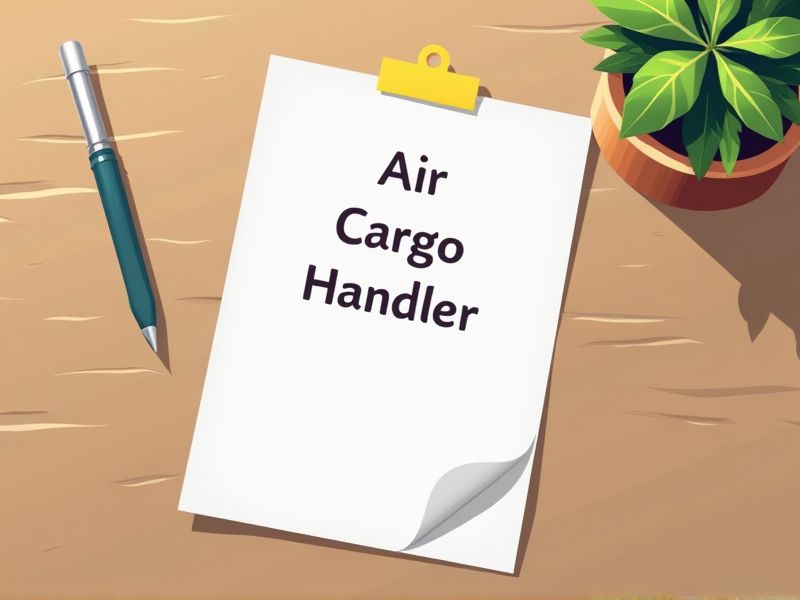
Air Cargo Handlers have critical responsibilities associated with the safe and efficient transportation of goods. Proper certifications ensure professionals are knowledgeable about industry regulations and safety protocols. This expertise minimizes mistakes, optimizing both operational safety and efficiency. Below are essential certifications that may be required for Air Cargo Handlers.
IATA Dangerous Goods Regulations (DGR) Certification
IATA Dangerous Goods Regulations (DGR) Certification is necessary to ensure air cargo handlers understand the guidelines for safely transporting hazardous materials, reducing the risk of accidents. Compliance with IATA DGR enhances operational reliability as handlers are trained to identify and properly manage dangerous goods. Regulatory adherence protects airlines from substantial fines and legal liabilities associated with improper handling of hazardous cargo. Certification demonstrates a commitment to maintaining safety standards, fostering trust among clients and aviation partners.
IATA Cargo and Logistics Certification
An IATA Cargo and Logistics Certification ensures that an air cargo handler possesses the necessary knowledge of international air cargo transport regulations, leading to improved compliance with global standards. Mastery of logistics and cargo handling techniques enhances efficiency in cargo management and reduces the risk of damage during transit. Certification indicates that the handler can adapt to rapidly changing industry protocols, ensuring safe and timely shipments. As airlines increasingly demand certified handlers, possessing such certification can enhance career prospects and potential earning capacity in the industry.
IATA Airport Operations Certification
The IATA Airport Operations Certification equips air cargo handlers with standardized knowledge critical for ensuring safety and compliance in cargo management. This certification enhances operational efficiency by providing handlers with up-to-date skills and knowledge of international regulations. Employers often require this certification as it demonstrates a handler's commitment to maintaining industry standards. As global air cargo operations become more complex, having certified professionals helps mitigate risks and streamline logistics operations.
Dangerous Goods Safety Advisor (DGSA) Certification
Transporting dangerous goods involves substantial risk, necessitating comprehensive safety measures. DGSA certification equips air cargo handlers with the expertise to handle hazardous materials safely, reducing the likelihood of accidents. Regulatory compliance mandates handlers to be knowledgeable about current safety regulations and practices. Certification ensures air cargo handlers are prepared for potential emergencies, mitigating operational disruptions.
Transportation Worker Identification Credential (TWIC)
The Transportation Worker Identification Credential (TWIC) enhances security by ensuring that individuals accessing secure areas have undergone thorough background checks. Air cargo handlers often work in sensitive zones within airports, where the handling of freight requires adherence to strict regulatory standards. TWIC compliance helps streamline the logistics process by providing an industry-wide standardized identification, reducing security processing time. This card ensures only authorized personnel engage with critical infrastructure, mitigating risk in air transport operations.
OSHA Forklift Operator Certification
OSHA Forklift Operator Certification is essential for air cargo handlers to ensure safe and effective handling of heavy cargo. This certification reduces the risk of workplace accidents, decreasing potential injuries and costs associated with them. It also ensures compliance with federal regulations, preventing legal issues and operational disruptions. Properly trained operators contribute to efficient cargo management, enhancing overall productivity and reliability in air transport.
IATA Perishable Cargo Handling Certification
IATA Perishable Cargo Handling Certification ensures air cargo handlers are equipped with the knowledge to properly manage temperature-sensitive goods, reducing spoilage risks. This certification also enhances compliance with international standards, boosting operational efficiency and safety. Airlines benefit from this by gaining trust from clients who need assurance that perishable items like food and pharmaceuticals will reach destinations in optimal condition. Better handling of such cargo can lead to fewer claims and increased satisfaction, fostering stronger customer relationships.
ICAO Air Cargo Handling Certification
Gaining the ICAO Air Cargo Handling Certification ensures that air cargo handlers adhere to international safety and security standards, minimizing risks and preserving cargo integrity. It enhances operational efficiency by providing standardized procedures that streamline the handling process, reducing delays and errors. Certification instills confidence among clients and stakeholders, demonstrating a commitment to safety, quality, and best practices in cargo handling operations. The adoption of certified practices helps in mitigating environmental impact by ensuring compliance with regulations on sustainability and eco-friendly procedures.
ISO 9001 Quality Management Certification
ISO 9001 Quality Management Certification enhances operational efficiency by ensuring consistent and reliable processes for air cargo handlers. A standardized framework helps mitigate risks in handling and transporting cargo, reducing the likelihood of errors and losses. Customers often seek certified handlers, as it signifies a commitment to quality and reliability, which can lead to increased business opportunities. The certification aids in compliance with international regulations and improves overall service delivery by promoting a culture of continuous improvement.
Air Cargo Training Council (ACTC) Certification
Having an Air Cargo Training Council (ACTC) Certification ensures that air cargo handlers are knowledgeable about international safety and security regulations. Being certified aids in minimizing operational risks and improving the efficiency of cargo handling procedures. Possessing this certification enhances a handler's credibility and employability in a competitive job market. Certification also helps in maintaining compliance with industry standards, avoiding potential penalties or operational interruptions.
Summary
Gaining certifications can enhance your expertise and credibility as an Air Cargo Handler. Certified handlers are more likely to secure better job opportunities and command higher salaries. The training involved in certification can lead to improved safety standards and operational efficiency. Employers tend to favor certified handlers, resulting in increased job stability and career advancement potential for you.
